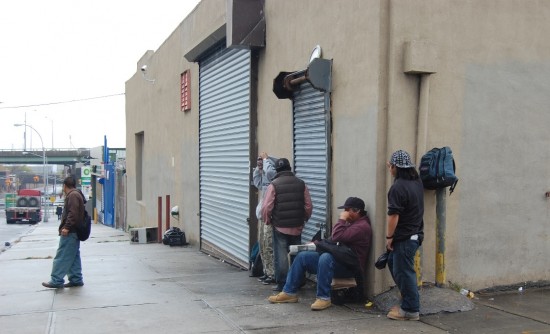
As the economy sputters, immigrants wait in vain at ‘La Parada’
By Carla Candia
carla.candia@journalism.cuny.edu
Dozens of day laborers dressed in ripped jeans and worn t-shirts stood on the corner of East 141st Street and Jackson Avenue in the Bronx one morning this Fall.
The wind was blowing, and many workers wore sweaters and had their hands tucked in their pockets. They were eating sandwiches and drinking coffee provided by an evangelical group called Together in Misericordia.
“We see their needs and want to help them,” Ramon Mendez, a member of the religious organization, speaking in Spanish, as did all those interviewed for this story.
These days the men who wait for contractors to hire them for the day need all the help they can get. Things have been slow at “La Parada,” which means “The Stop.”
More and more frequently, the workers who gather there, most of them Latino and most of them undocumented, wait on the corner for eight hours or more without an offer of employment.
On that October morning, most of them hadn’t been able to find work for two weeks.
Rafael, 38, from Dominican Republic, says he’s been a regular at “La Parada” for eight years. He’s never seen it so bad.
“This is for dogs,” Rafael said about the fruitless all-day wait. “My body hurts. Sometimes I arrive home more tired than if I’d been actually working.”
Gustavo is trying to earn enough to go back home to Puebla, Mexico, where his wife and four children live.
The 32-year-old, who has been living in New York City for five years, loathes the wasted days when he returns home with no money in his pockets.
“I feel disappointed and sad,” he said with gloomy eyes. “I try to think that the next day is going to be better.”
Because they don’t have money, Gustavo and his brother, Julio, 38, walk to “La Parada” every morning from Manhattan. Their hike from East 103rd Street takes them between 45 minutes and an hour.
Without jobs, laborers from “La Parada,” sometimes must depend on charity to survive.
Alberto, 42, who came to the U.S. seven years ago from El Salvador, regularly goes to soup kitchens or shelters for food and a warm place to sleep. “If churches didn’t give us food, this would be worse,” he said.
There are other spots where laborers can look for day jobs, but the competition is more ferocious than on East 141st Street and Jackson Avenue.
“In other places, there can be 300 or 400 people,” said Gustavo.
On “La Parada,” names are commonly replaced by nicknames like Ganso (Goose), Chino Mexicano (Chinese Mexican), Capullo (Cocoon) and Mapache (Raccoon). Gustavo and Julio are known as “Los Hermanos Puebla”
“Sometimes we have stories we don’t want people to know, and that’s why some won’t give their names,” said Gustavo.
Hours pass slowly at “La Parada.” Some of the laborers read the paper and talk about politics and world issues. Others drink.
The drinkers are called “The Cobras,” a reference to Cobra beer. They usually drink out of bottles and cans covered by paper bags.
“I’ve already got a ticket from the police for being with “The Cobras,” said Rafael.
According to Gustavo, fines range from $75 to $120. The Police Department did not return calls and emails seeking comment on its policy toward street-corner shape-ups.
Business owners in the area are unhappy about the gathering of workers.
“It’s a double-edged sword. I feel sympathy because they are trying to find a job, but I don’t want them in my backyard,” said one man, who would not give his name for fear of reprisals from the day laborers. “Sometimes they drink and urinate.”
Julio said that he goes to “La Parada” not because he wants to, but because he doesn’t have another choice.
“If we had a steady job, we wouldn’t be here all day,” he said.
In November, he decided to go back to Mexico after two years in New York.
“He got tired of not finding a job, and he didn’t want to stay for another winter,” said his brother.
But, like many other day laborers, Gustavo says he will endure the cold in the hope of finding a steady job.
“I’m always here. Rain or shine,” he said.
A version of this story appeared in the Winter 2009 edition of the Mott Haven Herald.

[…] recycling woes in Mott Haven made the Mott Haven Herald. Carla Candia, meanwhile, wrote about the day laborers who congregate on E. 141st St. and Jackson […]